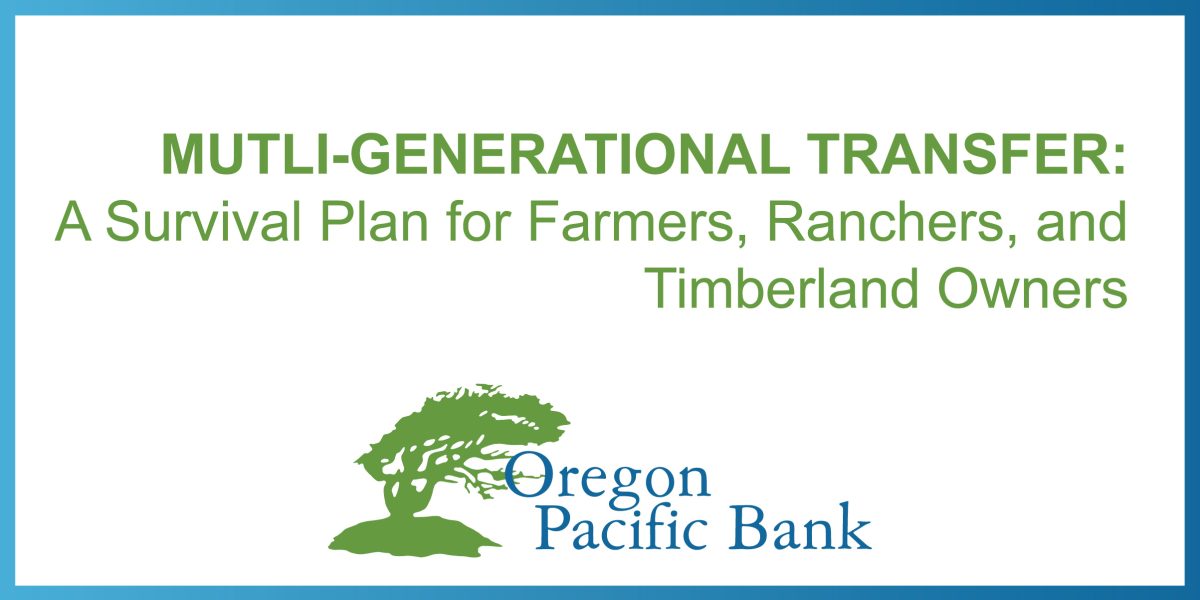Mutli-generational Transfer: A Survival Plan for Farmers, Ranchers, and Timberland Owners
Ranches, dairies, timberlands, wineries, and cranberry bogs are unique to our area. Such businesses are more than a way of making a living. They are about preserving a legacy and unique way of life. The U.S. Department of Agriculture National Agricultural Statistics Service reports that family-owned farms account for 97 percent of the 2.1 million farms in the U.S. Yet only 30% of these farms survive into the second generation, and only 12% are still operating by the third. 69% of the family farms surveyed expected ownership to continue into the next generation, but only 23% had a workable plan. Many of our local landowners have a common problem in that much of their wealth is tied up in illiquid land, equipment, or timber. The primary reason farms and ranches do not survive is that the owner does not have a survival plan. Family pressures often result in a hurried sale of the property to satisfy heirs, pay taxes, and meet other obligations.
The incapacity or death of an owner creates unique and substantial challenges to the successful transfer of the business to the next generation or liquidation and satisfaction of the interests of your heirs. When the owner is no longer available to manage the business, immediate demands arise for someone to take control of the business and keep it operating, including liquidity needs, operational continuity, taxes, and more. It is important that you have people you trust that know you, your family, and your operation that have the expertise and can step in to help during these times of high emotional and financial stress. Whether the property is to be sold or transferred to the next generation, experienced professionals are necessary to facilitate the process and prepare the necessary forms and filings. Many landowners assign that responsibility to an adult child who is currently working in the business or, as we often see, has their own career and life outside the family holdings. While this may be well-intended, it may cause conflict within the landowning family—especially among those children who are not involved in the business.
As an alternative, many owners opt to appoint a professional Trustee or Executor (a bank trust department) with an experienced, capable (and insured) professional fiduciary. The fiduciary has the skills and team to administer the estate as efficiently and cost-effectively as possible—all the while ensuring the assets and operations are transferred according to the terms of the owner’s Trust or Last Will and at the lowest transfer tax cost.
Oregon Pacific Bank’s service area is in rural Oregon. Over the past twenty-five years, the need for such a role has presented itself time and again. Fortunately, the Bank has the expertise and resources to administer the most complex Trusts and Estates involving farm, ranch, and timberland businesses. The Bank’s role becomes primarily that of a facilitator overseeing all areas of administration, including conferring with experienced CPAs, legal advisors, appraisers, foresters, and interceding with governmental agencies, etc., as needed. The Bank liaisons with professionals in the community whose skills and fee schedules are evaluated and their role defined. Moreover, the Bank has in-house expertise and a powerful accounting system and investment department, which reduces the need for the ongoing expensive consultations an inexperienced individual Trustee might require, thereby diminishing the forthcoming inheritance of the heirs and beneficiaries.
Throughout the course of the administration, the business assets must be protected, and the short-or-long term financial security of the business and beneficiaries must be taken into consideration. It may be necessary to raise cash to manage debt and expenses after incapacity or death. Timber may have to be sold, proper land rent rates established, and crop shares arranged. These responsibilities are complex and something the owner may not have considered when ‘honoring’ a family member by harnessing them with the obligation to administer a large and/or unique estate or trust. Knowing where to go and whom to contact for the best result is valuable to you and your heirs.
Tax liability is another area of complexity. While the federal estate tax is currently about $11.7 million per person (this amount is scheduled to be reduced after 2025), it is often overlooked that Oregon’s estate tax applies to estates over $1 million and the estate tax return is due, and payment must be made, 9 months after death. Oregon tax rates range from 10 to 16 percent. To minimize the estate tax, valuations for estate tax purposes must be obtained and applicable discounts determined by trained professionals. There are other tax breaks available for agricultural property that must be evaluated. Without professional guidance, the heirs may miss out on the benefit of tax strategies that would increase their inheritance and reduce the deceased owner’s tax liability and immediate cash requirements.
In short, an individual charged with the responsibility and potential liability of transferring wealth in one form or the other from one generation to another generation has a very steep learning curve. While the individual may have experience in the business operations, they likely do not have the required experience as a trustee or executor. They will spend a great deal of time in meetings with attorneys and accountants who may or may not have adequate experience in this specialized area. On the other hand, the Bank has the expertise and resources to minimize legal fees, obtain quality valuations, maintain operations, and control the cash flow and investments of the business. This does not mean that a family representative or representatives cannot work or communicate with the Bank. Rather the heirs are encouraged to talk to their Trust Officer, who is available to discuss all aspects of the ongoing administration and keep all parties informed. This is a most important aspect of our service. The work of the administration is overseen by the Bank’s Trust Committee as well as state and federal regulators. Beneficiaries and their advisors receive quarterly statements. All activity within the estate is entirely transparent, thereby eliminating any risk of distrust within the family or fraudulent activity on the part of the Trustee.
Farmers and ranchers lead a complex lifestyle and require specialized solutions. A team of advisors, including attorneys, accountants, and bankers can help you create and maintain a plan that will preserve your legacy, your lifestyle, and your way of life for your lifetime and for future generations. Please contact Oregon Pacific Bank if you would like to arrange for a consultation.







